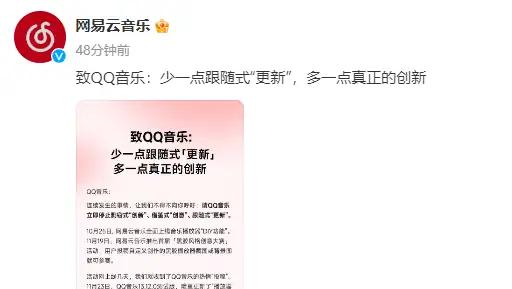Music Streaming Wars: Innovation vs Imitation
NetEase Cloud Music publicly called out QQ Music for repeatedly copying their features, highlighting tensions between China’s top music streaming platforms and raising questions about innovation in the industry.

The battle between China’s leading music streaming platforms has reached a new crescendo. NetEase Cloud Music, one of China’s largest music streaming services, recently issued a public statement accusing rival QQ Music of systematic feature copying, reigniting discussions about innovation and competition in China’s digital music landscape.
The controversy ignited when NetEase Cloud Music launched their DIY music player customization feature on October 25th, allowing users to personalize their player interface with uploaded images. Just four days after NetEase organized their first “Vinyl Style Creative Competition” around this feature, QQ Music released a remarkably similar “player customization function.”
This incident represents just the latest chapter in a complex relationship between these tech giants. NetEase’s statement meticulously documented previous instances where QQ Music allegedly copied their innovations, including the black vinyl player interface, co-listening features, and palace-themed music players.
The fundamental challenge facing these platforms extends beyond mere feature copying. China’s streaming services are caught in a difficult balancing act between commercial success and musical innovation. While basic music player functionality has been largely standardized for years, platforms must still compete for user attention and market share.
Industry experts suggest that the real differentiation should come from music licensing and content rather than interface features. As one user commented, “Instead of focusing on copying UI elements, these platforms should invest more in expanding their music libraries and securing exclusive rights.”
The incident also reflects broader patterns in China’s internet industry, where rapid iteration and feature adoption between competitors has become commonplace. This practice raises important questions about the line between inspiration and imitation, and whether such behavior ultimately helps or hinders innovation in the digital music space.
For users, this competition has mixed implications. While feature copying may lead to quick standardization of useful functions across platforms, it might also discourage companies from making significant investments in truly groundbreaking innovations.
The dispute has sparked significant discussion among users, with many pointing out that both platforms would better serve their audiences by focusing on core music streaming capabilities and copyright acquisition rather than engaging in feature wars. Some users have noted deteriorating experiences on both platforms due to increasingly bloated interfaces and aggressive monetization strategies.
Moving forward, this incident may prompt deeper industry discussions about innovation, competition, and intellectual property in China’s digital music sector. The challenge for these platforms will be finding ways to differentiate themselves while maintaining user experience and sustainable business models.